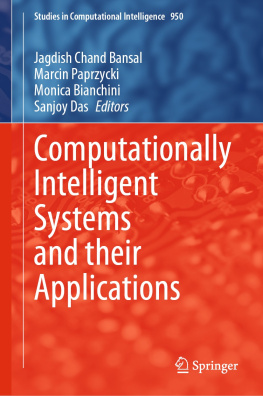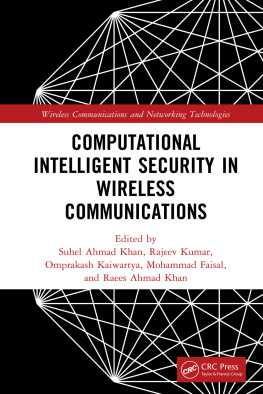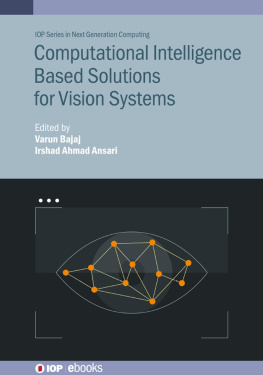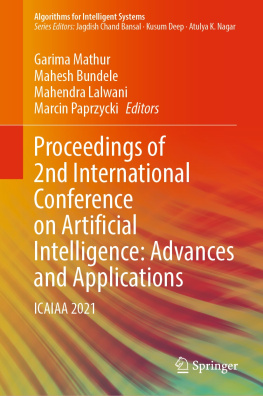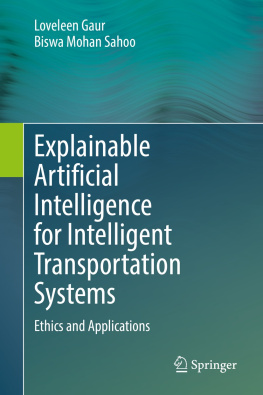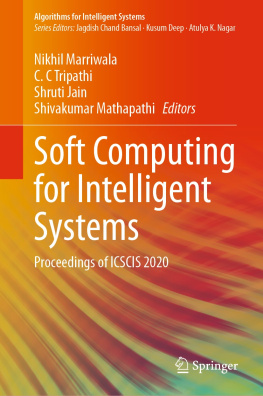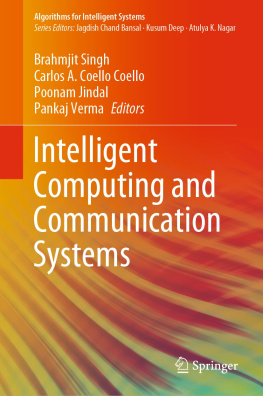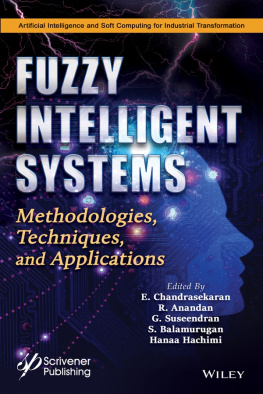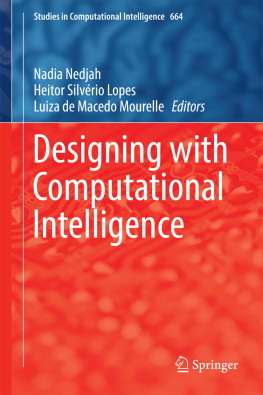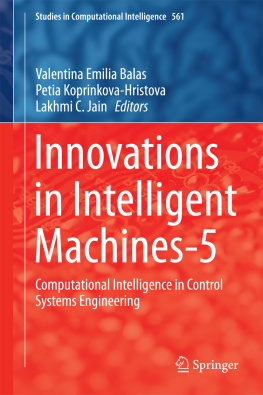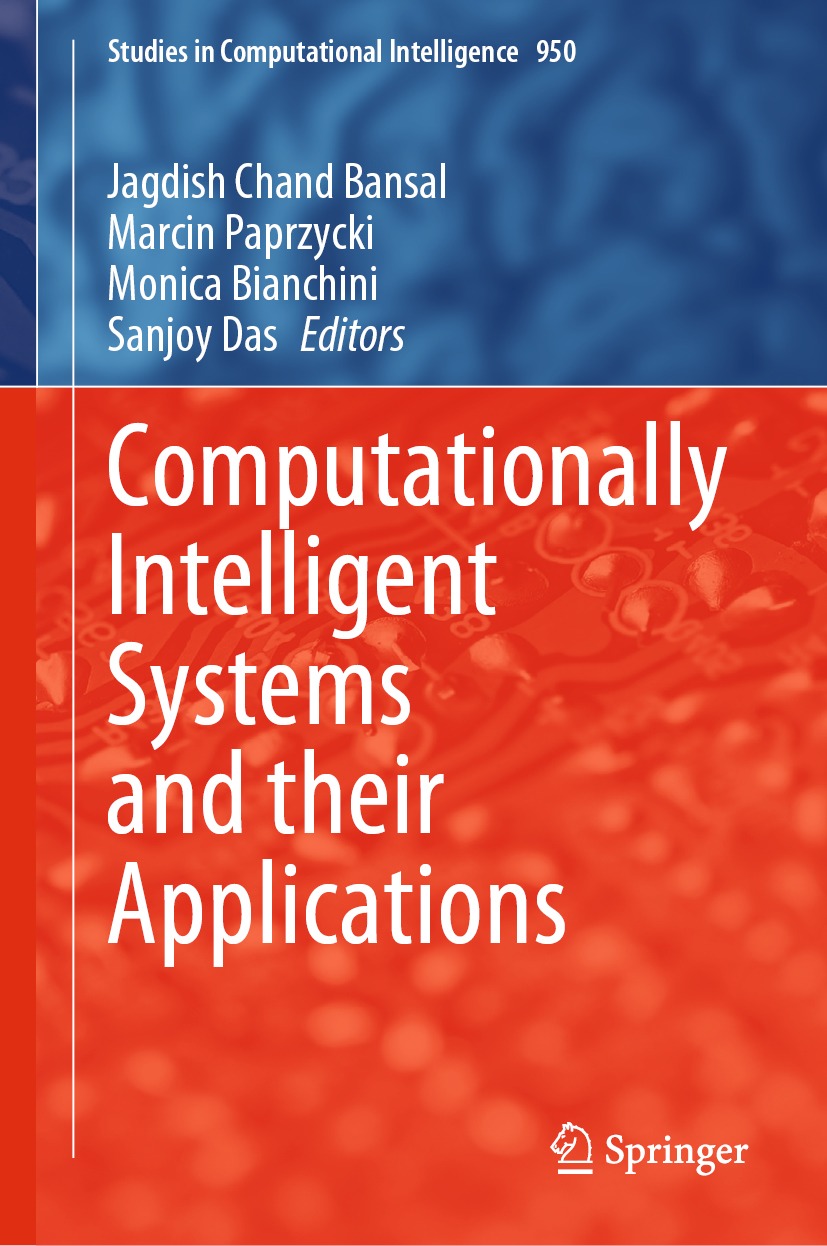Volume 950
Studies in Computational Intelligence
Series Editor
Janusz Kacprzyk
Polish Academy of Sciences, Warsaw, Poland
The series Studies in Computational Intelligence (SCI) publishes new developments and advances in the various areas of computational intelligencequickly and with a high quality. The intent is to cover the theory, applications, and design methods of computational intelligence, as embedded in the fields of engineering, computer science, physics and life sciences, as well as the methodologies behind them. The series contains monographs, lecture notes and edited volumes in computational intelligence spanning the areas of neural networks, connectionist systems, genetic algorithms, evolutionary computation, artificial intelligence, cellular automata, self-organizing systems, soft computing, fuzzy systems, and hybrid intelligent systems. Of particular value to both the contributors and the readership are the short publication timeframe and the world-wide distribution, which enable both wide and rapid dissemination of research output.
Indexed by SCOPUS, DBLP, WTI Frankfurt eG, zbMATH, SCImago.
All books published in the series are submitted for consideration in Web of Science.
More information about this series at http://www.springer.com/series/7092
Editors
Jagdish Chand Bansal , Marcin Paprzycki , Monica Bianchini and Sanjoy Das
Computationally Intelligent Systems and their Applications
1st ed. 2021

Logo of the publisher
Editors
Jagdish Chand Bansal
Department of Applied Mathematics, South Asian University, New Delhi, India
Marcin Paprzycki
Systems Research Institute, Polish Academy of Sciences, Warsaw, Poland
Monica Bianchini
Department of Information Engineering and Mathematics, University of Siena, Siena, Italy
Sanjoy Das
Department of Computer Science and Engineering, Indira Gandhi National Tribal University, Imphal, India
ISSN 1860-949X e-ISSN 1860-9503
Studies in Computational Intelligence
ISBN 978-981-16-0406-5 e-ISBN 978-981-16-0407-2
https://doi.org/10.1007/978-981-16-0407-2
The Editor(s) (if applicable) and The Author(s), under exclusive license to Springer Nature Singapore Pte Ltd. 2021
This work is subject to copyright. All rights are solely and exclusively licensed by the Publisher, whether the whole or part of the material is concerned, specifically the rights of translation, reprinting, reuse of illustrations, recitation, broadcasting, reproduction on microfilms or in any other physical way, and transmission or information storage and retrieval, electronic adaptation, computer software, or by similar or dissimilar methodology now known or hereafter developed.
The use of general descriptive names, registered names, trademarks, service marks, etc. in this publication does not imply, even in the absence of a specific statement, that such names are exempt from the relevant protective laws and regulations and therefore free for general use.
The publisher, the authors and the editors are safe to assume that the advice and information in this book are believed to be true and accurate at the date of publication. Neither the publisher nor the authors or the editors give a warranty, expressed or implied, with respect to the material contained herein or for any errors or omissions that may have been made. The publisher remains neutral with regard to jurisdictional claims in published maps and institutional affiliations.
This Springer imprint is published by the registered company Springer Nature Singapore Pte Ltd.
The registered company address is: 152 Beach Road, #21-01/04 Gateway East, Singapore 189721, Singapore
Preface
Computationally intelligent system is a new concept for advanced information processing. The objective of this system is to realize a new approach for analysing and creating flexible information processing of sensing, learning, recognizing and action taking. Computational intelligent is a part of artificial intelligence (AI) which includes the study of versatile components to empower or encourage savvy practices in intricate and evolving situations. This new trend of computational intelligence applications seek the adaptation of computational neural network algorithms and techniques in many application domains, including software systems, cybersecurity, human activity recognition and behavioural modelling. As such, the computational neural network algorithms can be refined to address problems in data-driven applications. The computationally intelligent system highly relies on numerical information supplied by manufacturers unlike AI. The book covers all the core technologies like neural networks, fuzzy systems and evolutionary computation and their applications in the systems.
This book aims to foster the computationally intelligent system, its features and applications. Original research and review articles with model and computationally intelligent system applications using computational algorithm are included as different chapters. The reader will learn on various computationally intelligent system applications and their behaviours in order to extract key features. The book will enable researchers from academia and industry to share innovative applications and creative solutions to common problems using computational intelligence.
Jagdish Chand Bansal
Marcin Paprzycki
Monica Bianchini
Sanjoy Das
New Delhi, India Warsaw, Poland Siena, Italy Imphal, India
Contents
Pritam Khan , Yasin Khan and Sudhir Kumar
Tuhin Banerjee and Saroj Koul
Richa Golash and Yogendra Kumar Jain
Anand Singh Rajawat , Romil Rawat , Kanishk Barhanpurkar , Rabindra Nath Shaw and Ankush Ghosh
Saroj Kushwah , Bharti Kalra and Sanjoy Das
Aditi Paul , Somnath Sinha , Rabindra Nath Shaw and Ankush Ghosh
Anand Singh Rajawat , Romil Rawat , Kanishk Barhanpurkar , Rabindra Nath Shaw and Ankush Ghosh
Punit Khatri , Karunesh Kumar Gupta and Raj Kumar Gupta
Romil Rawat , Vinod Mahor , Sachin Chirgaiya , Rabindra Nath Shaw and Ankush Ghosh
Munsifa F. Khan and Indrani Das
Ashwini Kumar , Sanjoy Das , Vishu Tyagi , Rabindra Nath Shaw and Ankush Ghosh
Md Montaser Hamid , Tanvir Alam and Md Forhad Rabbi
Editors and Contributors
About the Editors
Dr. Jagdish Chand Bansal
is Associate Professor at South Asian University New Delhi and Visiting Faculty at Maths and Computer Science, Liverpool Hope University UK. Dr. Bansal has obtained his Ph.D. in Mathematics from IIT Roorkee. Before joining SAU New Delhi, he has worked as Assistant Professor at ABV-Indian Institute of Information Technology and Management Gwalior and BITS Pilani, India. His primary area of interest is swarm intelligence and nature-inspired optimization techniques. Recently, he proposed a fissionfusion social structure-based optimization algorithm, Spider Monkey Optimization (SMO), which is being applied to various problems from the engineering domain. He has published more than 60 research papers in various international journals/conferences. He has also received Gold Medal at UG and PG levels. Apart from SADIC, he is also Series Editor of the series Algorithms for Intelligent Systems (AIS) published by Springer. He is Editor-in-Chief of International Journal of Swarm Intelligence (IJSI) published by Inderscience. He is also Associate Editor of IEEE ACCESS (IEEE) and ARRAY (Elsevier). He is the steering committee member and the general chair of the annual conference series SocProS. He is the general secretary of Soft Computing Research Society (SCRS).

